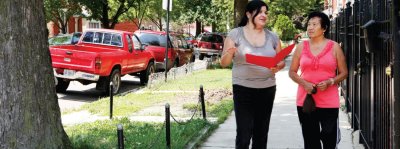
New findings from the largest community-driven, face-to-face health survey ever conducted in Chicago show there continue to be significant, sometimes devastating disparities in the health and wellness of different racial and ethnic groups in Chicago, exacerbated in certain communities. Led by Sinai Urban Health Institute (SUHI), researchers surveyed more than 1,900 residents across nine neighborhoods. The survey findings illuminate serious disparities in the health and social wellbeing of residents, with eight neighborhoods lagging behind national benchmarks for a wide range of health problems and risk factors.

Beyond more traditional health outcomes, Sinai Community Health Survey 2.0 measured a variety of social factors from food insecurity to mental health to criminal justice encounters. Together the data show that significant numbers of Chicagoans are struggling to maintain good physical and mental health, and get the care they need, while challenged by a broad range of risk factors like food insecurity, domestic violence, post-traumatic stress disorder, smoking and obesity. “The data paint a stark and complex picture of health and wellness in many Chicago communities, varied by race, income and ethnicity, demonstrating the value in collecting hyperlocal information,” said Dr. Sharon Homan, president of the Sinai Urban Health Institute. “To develop meaningful interventions to improve health, we must first understand the constellation of social factors that impact people and families within each community.”
Sinai Community Health Survey 2.0 provides a deep, comprehensive view of health and related social factors in nine diverse Chicago communities: Chicago Lawn, Gage Park, Hermosa, Humboldt Park, North Lawndale, Norwood Park, South Lawndale, West Englewood and part of West Town . The survey included more than 500 questions related to behaviors, clinical care, social and economic factors and the physical environment. “There is nothing more basic and essential to human happiness than health and wellbeing—conditions determined by both an individual’s circumstance and behavior,” said Terry Mazany, president and CEO of The Chicago Community Trust, which funded the survey with a $1 million grant. “The large disparities that exist between neighborhoods only miles apart should be troubling—and, at the same time, offer opportunities for solutions.”












